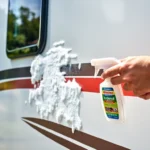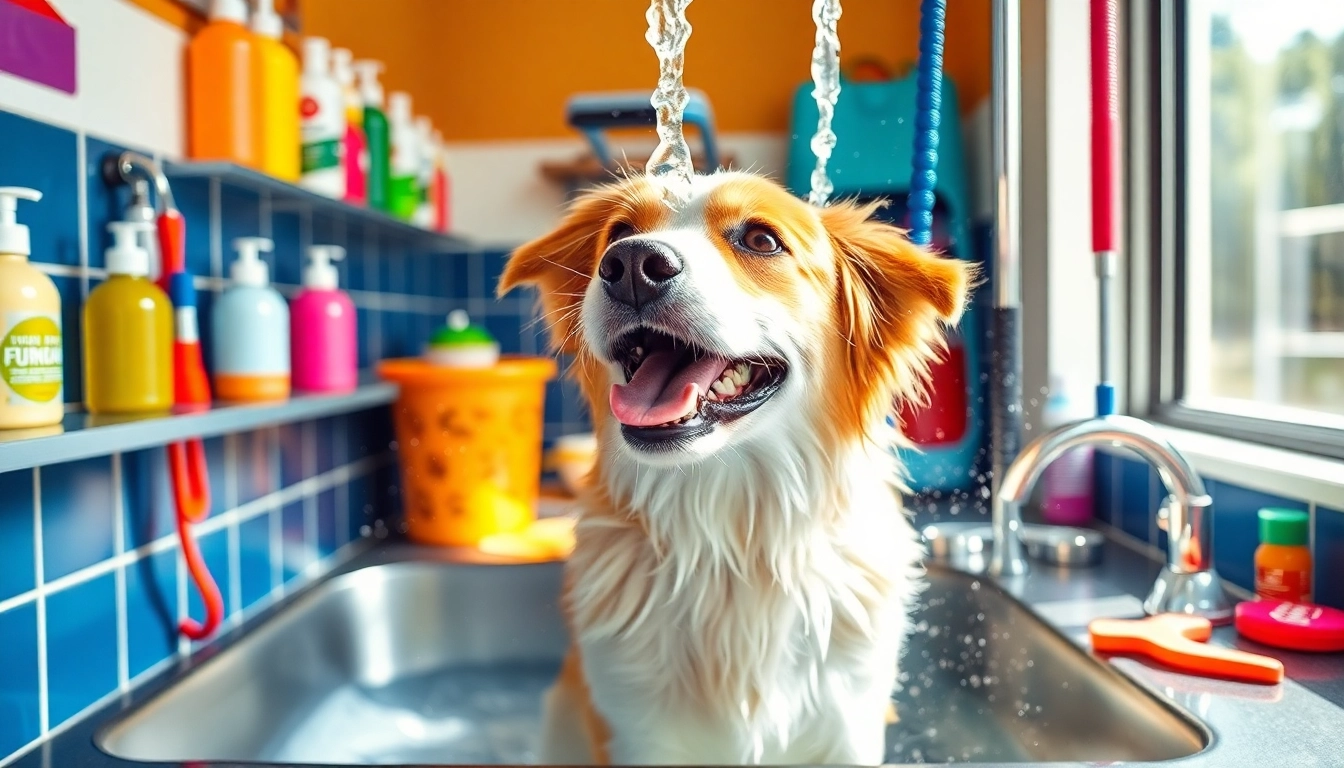Understanding the Importance of Regular Dog Washes
Taking care of your furry friend’s hygiene is as essential as providing them with a healthy diet and ensuring they get enough exercise. It’s not just about keeping their fur looking great; a dog wash near me can have significant benefits for their health and well-being. Regular washing helps eliminate dirt, dander, and allergens, thereby improving your pet’s health. This article examines the benefits of regular dog washes and why choosing the right service is essential for you and your pup.
Benefits of Frequent Cleaning
Regular dog washes are crucial for various reasons. They not only help keep your dog clean but also contribute to their overall health. Let’s dive into the benefits:
- Improved Skin Health: Frequent washing helps prevent skin infections and irritation, particularly in areas prone to allergies.
- Odor Control: Regular cleaning reduces dog odor, making your home a more pleasant place to live.
- Flea and Tick Prevention: Bathing can help eliminate fleas, ticks, and other parasites that can make your dog uncomfortable.
- Enhanced Bonding: Washing your dog is an excellent opportunity for bonding, further strengthening your relationship.
- Training Opportunity: Regular baths can help acclimate your dog to grooming tools, making future grooming sessions easier.
Health Benefits for Your Dog
Beyond aesthetics, regular bathing has health implications. Here are vital health aspects influenced by frequent washing:
- Allergy Management: Regular washing reduces allergens like pollen and dust from settling in your dog’s coat.
- Skin Infections: Dogs with long coats are particularly susceptible to matting, which can trap moisture and leads to bacterial infections.
- Ectoparasite Elimination: Regular washing with medicated shampoos can help treat and prevent infestations of fleas and ticks.
Common Myths About Dog Washing
Despite the benefits, myths about dog washing can lead to improper practices. Let’s debunk some common myths:
- Myth: Dogs Don’t Need Baths Unless They’re Dirty. Reality: Dust, dander, and allergens accumulate even in clean dogs, necessitating regular baths.
- Myth: Bathing Too Often Can Harm a Dog’s Skin. Reality: With proper products, regular bathing is beneficial. It’s essential to use dog-specific shampoos.
- Myth: It’s Okay to Use Human Shampoo on Dogs. Reality: Human shampoos can disrupt a dog’s skin pH balance and lead to irritation. Always choose dog-specific products.
How to Choose a Dog Wash Near Me
Finding a suitable dog wash is vital for your pet’s grooming experience. Here are factors to consider when choosing a dog wash service close to you:
Key Features to Look For
Not all dog washes are created equal. Here’s a list of features that can help you determine the best option:
- Equipment Quality: Ensure the facility has well-maintained equipment, including baths, dryers, and grooming tools.
- Products Used: Look for establishments that use high-quality shampoos and conditioners tailored for various coat types.
- Expert Staff: Knowledgeable staff can provide valuable tips and assistance during the washing process.
Pricing Structure: What to Expect
When it comes to pricing, different facilities have various structures. On average, expect to pay:
- $10 to $30 for self-service washes depending on the location and amenities.
- $20 to $50 for full-service dog washing, which may include grooming services.
- Discounts may be available for multiple visits or package purchases, so inquire during your initial visit.
Customer Reviews and Recommendations
Before choosing a dog wash service, it’s sensible to check reviews from other pet owners. Here’s how to evaluate them:
- Platforms: Websites like Yelp or Google often contain candid customer feedback. Look for ratings and detailed reviews.
- Social Media: Many pet service providers engage with customers on social media, where you can assess service quality through comments and posts.
- Word of Mouth: Recommendations from fellow dog owners can direct you to highly-rated local services.
Top Self-Service Dog Wash Stations
If you’re considering a DIY dog wash approach, self-service stations can save you both time and mess at home. Here’s a closer look at popular options:
Popular Options in Your Area
Self-service dog washes are available in many locations. Notable chains include:
- Tractor Supply Co: Features wash stations equipped with high-velocity dryers and dog-friendly shampoos.
- PetSmart: Offers quick wash services and self-wash stations with all necessary supplies.
- Local Pet Shops: Many towns have independent stores with self-service dog wash basins set up for convenience.
Unique Services Offered
Different locations may offer specialized services, which can include:
- Hydrotherapy: Some stations provide hydrotherapy options to soothe sore joints and muscles.
- Grooming Tools: Stations may offer access to specialty grooming tools such as brushes or combs specifically designed for different coat types.
- Specialty Shampoos: Look for businesses that provide hypoallergenic or medicated shampoos for dogs with skin sensitivities.
Accessibility and Location Benefits
Choosing a conveniently located dog wash reduces stress and time spent commuting. Consider these factors:
- Proximity: Select a facility that’s easily accessible from your home or work to make visits more frequent and manageable.
- Parking Availability: Ensure the location has ample parking for easy drop-off and pick-up, especially when transporting a wet dog.
DIY Dog Washing Tips
If you prefer bathing your dog at home, setting up a home washing station can be both efficient and comforting for your pet. Here’s how to do it right:
Setting Up Your Home Washing Station
Creating an effective at-home dog wash area can help streamline the process. Consider these steps:
- Select a Location: Ideally, choose a space with easy cleanup, such as a laundry room or an outdoor space with water access.
- Gather Supplies: You’ll need dog shampoo, conditioner, towels, a brush, and a non-slip mat for safety.
- Temperature Control: Ensure the water temperature is lukewarm—not too hot nor too cold—to keep your dog comfortable.
Best Products for Dog Care
Choosing quality products is crucial for your dog’s skin and coat health. Here are some recommended types:
- Shampoos: Choose a shampoo specifically designed for dogs, preferably with natural ingredients that suit your dog’s coat type.
- Conditioners: Conditioning products can be beneficial for dogs with long or coarse coats, helping to detangle and soften.
- Grooming Tools: A good quality brush suited to your dog’s coat type can help minimize shedding and matting.
Step-by-Step Washing Guide
Follow this guide to ensure a successful and enjoyable washing experience:
- Preparation: Gather supplies and brush your dog beforehand to remove loose fur.
- Wet the Coat: Use a handheld sprayer or cup to wet your dog thoroughly, starting from the back and moving to the front.
- Apply Shampoo: Lather the shampoo well, avoiding contact with the eyes and ears.
- Rinse Completely: Ensure all shampoo is washed out, as residue can cause irritation.
- Condition: If using conditioner, apply it as per the product instructions and rinse thoroughly.
- Dry Off: Use towels to dry your dog, and consider a blow dryer on a low setting for added comfort, but keep it away from sensitive areas.
Frequently Asked Questions About Dog Wash
Have questions about dog washing? Here are the answers to some common inquiries:
What to Do if My Dog Dislikes Baths?
Many dogs are apprehensive about getting wet. Here are strategies to help your pup feel at ease:
- Desensitization: Start by introducing your dog to water gradually. Let them play in shallow water before full baths.
- Positive Reinforcement: Use treats, praise, and toys during bath time to create a positive association.
- Regular Exposure: Regularly bathing your dog can make it a routine, lessening their anxiety over time.
How Often Should I Wash My Dog?
The frequency of washing depends on several factors, including breed and activity level:
- Short-Haired Breeds: Typically require washing every 2-3 months.
- Long-Haired Breeds: May need more frequent baths, around once a month, depending on their coat condition.
- Active Dogs: Dogs that spend a lot of time outdoors may require more frequent washing to remove dirt and allergens.
Pros and Cons of Different Washing Options
It’s essential to weigh the benefits and drawbacks of various dog-washing methods:
- Self-Service Wash: Pros include convenience and affordability; cons might involve limited time and supplies.
- Professional Grooming: Pros include thorough cleaning and professional tools; cons may include higher costs.
- Home Washing: Pros include comfort for your dog and control over the process; cons include the potential for mess and increased labor.









